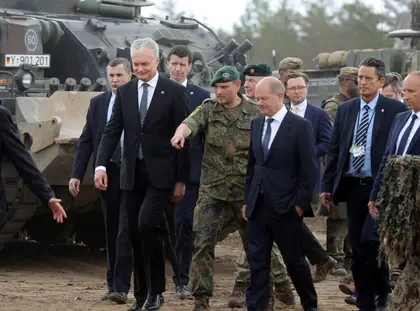While Russia’s war in Ukraine rages, Moscow has begun to openly threaten Lithuania after a ban was introduced on the rail transit of certain goods to Russia’s Kaliningrad enclave on June 17.
Despite the fact that the ban was known in advance since it was introduced as part of the fourth package of European Union sanctions, Russia began to talk about a “blockade” of the region and the need to “protect its national security.”
The governor of the Kaliningrad region claims that 40-50% of all cargo has been banned. Russia demands that the EU immediately resume transit from Kaliningrad via Lithuania.
The Kremlin has called the decision unprecedented and illegal.
“This decision is truly unprecedented; it is a violation of everything. We understand that this is due to the relevant decision of the European Union extend the sanctions to transit. We consider this illegal,” said Kremlin spokesman Dmitry Peskov.
Russian Security Council Secretary Nikolai Patrushev warns: “Russia will certainly react to such hostile actions. Relevant measures are being worked out in an interdepartmental format and will be taken in the near future. Their consequences will have a serious negative impact on the Lithuanian population,”
Patrushev said this at a national security meeting in Kaliningrad on June 21.
The Lithuanian authorities reject the Russian accusations. No blockade of Kaliningrad is taking place, they respond, because the sanctions imposed on Russia have been implemented by the EU as a whole because of the war in Ukraine.
“Any talk of a blockade of Kaliningrad is a lie. Lithuania is complying with the sanctions imposed by the EU on Russia for its aggression and war against Ukraine” Lithuanian Prime Minister Ingrida Simonyte explained on June 22.
“Russian rhetoric does not seem new to me. It is ironic to hear about violations of international agreements from a state that I don’t even know which of the international agreements it has not violated,” she added.
The U.S. declared full support for Lithuania in its dispute with Russia over transit to Kaliningrad.
“We support our NATO allies. We support Lithuania. Our commitment to NATO’s Article 5 is unbreakable,” said U.S. State Department spokesman Ned Price.
On June 25, the self-proclaimed president of Belarus, Alexander Lukashenko, at a meeting with Russian President Vladimir Putin, said that the blockade of the transit of certain goods to Kaliningrad “is akin to a declaration of war.”
On June 17, Lithuania’s main railway company imposed the sanctions on a line connecting Kaliningrad and Moscow via part of Lithuanian territory and Belarus.
Shipments to this former Prussian territory, which Russia annexed after World War II, can still be carried out by sea and land, but only if there aren’t goods included in the list of goods subject to sanctions imposed after the invasion of Russian troops in Ukraine.
You can also highlight the text and press Ctrl + Enter



